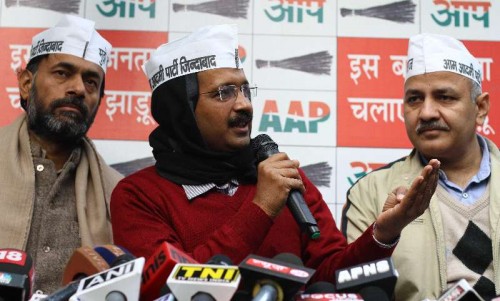
A year after Arvind Kejriwal resigned as chief minister leading to President’s rule, Delhi will elect a new assembly Feb 7 and the results will be known Feb 10, it was announced .
Election Commissioner V.S. Sampath said the last date for nomination of candidates will be Jan 21 and they could withdraw from the contest by Jan 24. Delhi has a 70-member legislature.
More than 1.3 crore people will be eligible to vote across 11,763 polling centres.
Sampath said the Model Code of Conduct would come into effect with immediate effect, barring the government from taking major policy decisions that could influence the electorate.
Delhi elected a hung assembly in December 2013 after which the Aam Aadmi Party formed a minority government headed by Kejriwal with Congress backing. Kejriwal resigned Feb 14, 2014.
President’s rule was imposed in the city Feb 17 last year.
Sampath said the poll panel had got complaints regarding fake or bogus voters from political parties, adding the issue had been addressed before the publication of electoral rolls Jan 5.
He admitted that the time given for campaigning was less as it was a single state election.
“Also, in Delhi’s case, there was enough anticipation for the election, so more time was not needed,” Sampath said.
He clarified that only outsiders would be deployed in Delhi as observers to oversee the electoral contest.
Monday’s announcement comes amid hectic election campaigning in the city, particularly by the BJP and the AAP.
On Saturday, Prime Minister Narendra Modi addressed a major election rally. The AAP has been holding small and big meetings every day. Both the parties are also locked in publicity war.
The 2013 election ended 15 years of rule by the Congress, whose seats in the 70-member house plunged from 43 in 2008 to just eight. Its vote share also fell from 40 to 25 percent.
The Bharatiya Janata Party (BJP) emerged as the single largest party with 31 seats followed by the AAP, which stunned everyone by bagging 28 seats in its debutant electoral battle.
With no single party in a position to form a government, the AAP took power with the outside legislative backing of the Congress. Kejriwal resigned after 49 days in power.
In the May 2014 Lok Sabha election, the BJP won all seven seats in the capital. The AAP took the second spot everywhere while the Congress came third in six constituencies and fourth in the seventh.